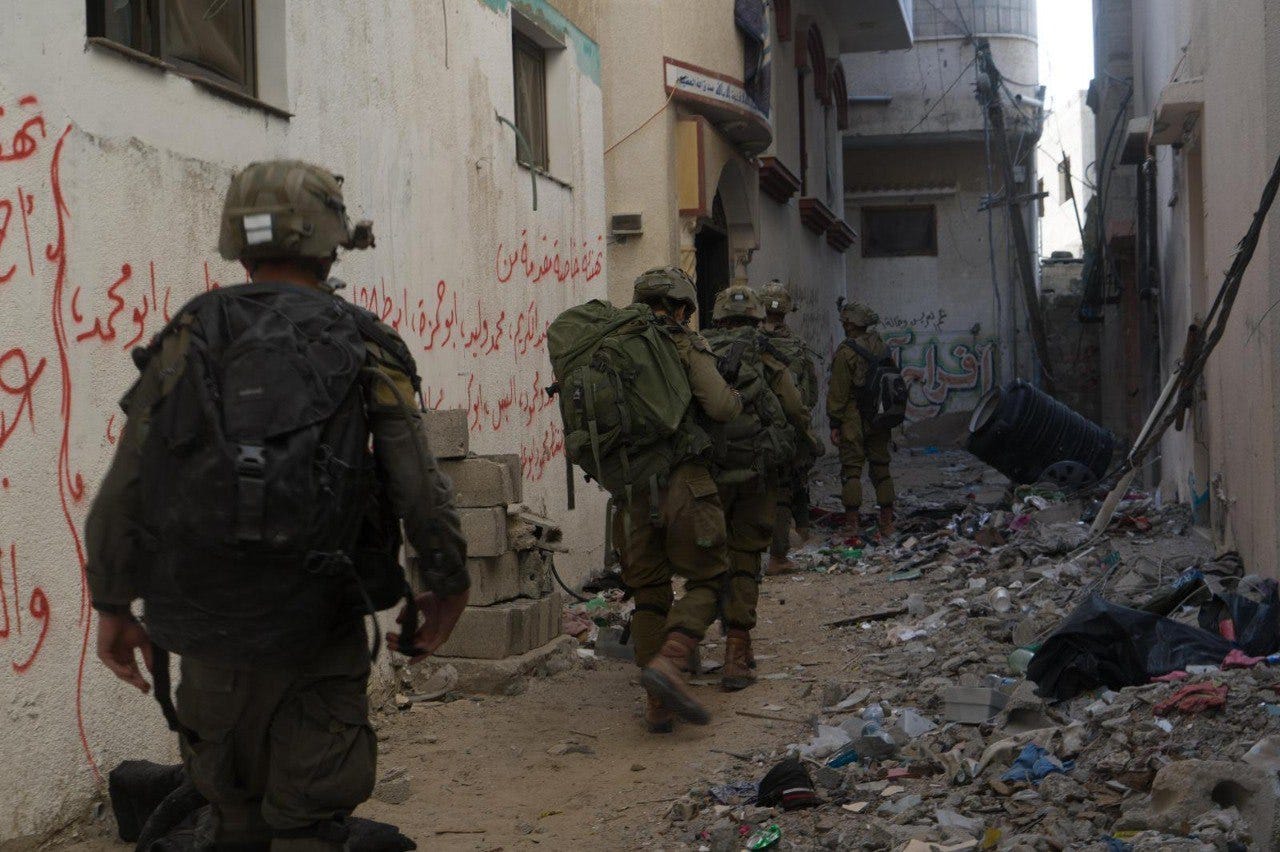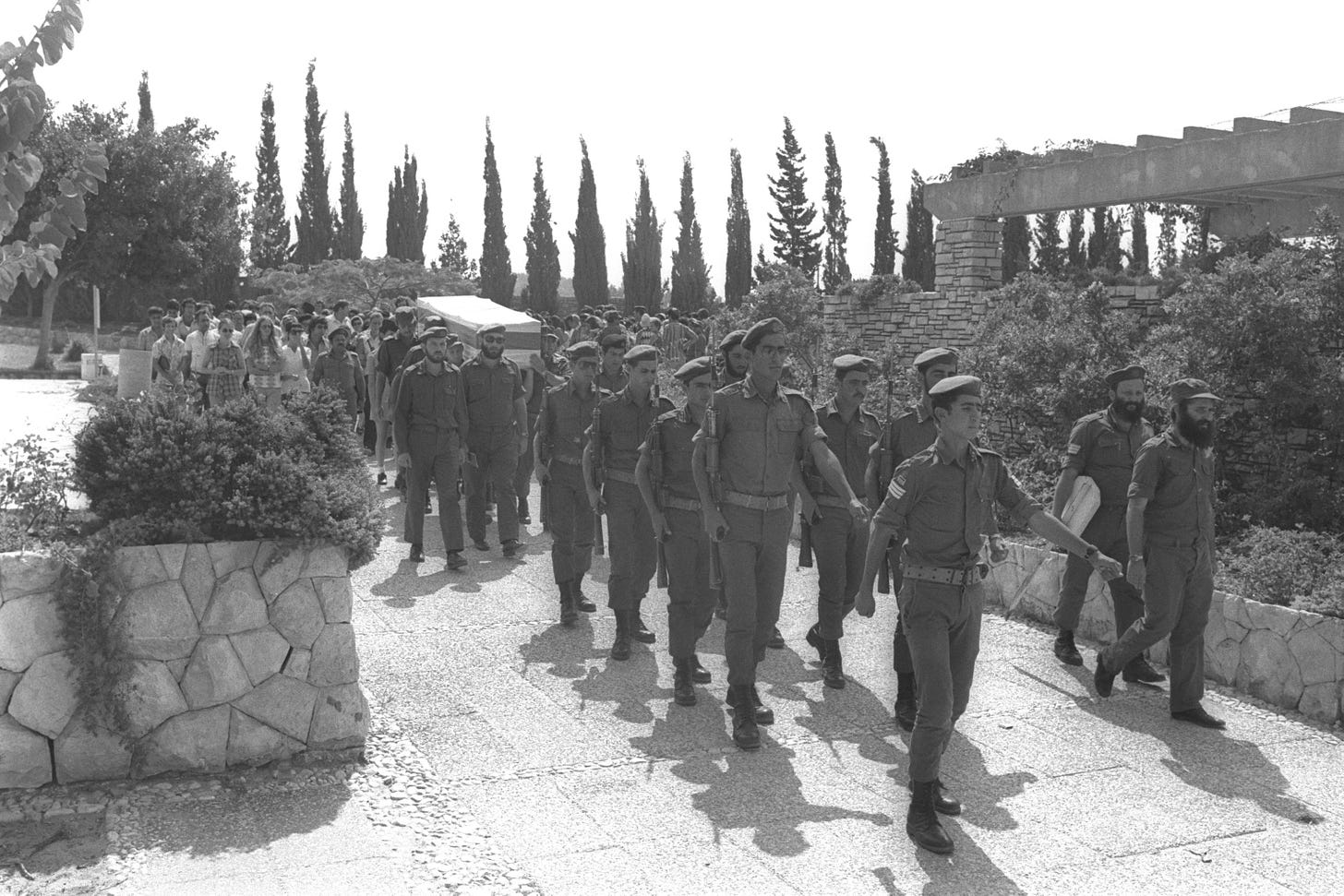DAY 219 OF THE WAR: Memorial Day in Israel, Eurovision, Demonstrations, Fighting in Northern Gaza, Blinken, IMI Halts Move South
Tel Aviv Diary, May 12, 2024
Tonight marks the beginning of Memorial Day in Israel. At 8 PM, sirens sounded throughout the country to signal the commencement of this solemn day. We remember and honor the 25,040 soldiers who sacrificed their lives to defend this country. Memorial Day is always an exceptionally somber day in Israel, but the sadness is immeasurable this year. This is the first Memorial Day observed in the midst of an ongoing war. Five new families began sitting shiva today.
Since last year, 1,537 Israelis have died at the hands of the enemy, marking the deadliest year since the Yom Kippur War. Unlike that war, which saw only military casualties, this year, both soldiers and civilians lost their lives. It has been a year of unprecedented grief for all of us. We’ve cried like never before, and that's even among those who have not lost those closest to us. During the last few days, renewed anger has surfaced, as it has become evident that October 7th was the beginning of seven months of additional tragedy.
Tonight and tomorrow, we will be once again be immersed in a continuous stream of stories of those who have given their lives to defend our state. The young men who were too young to marry and the older men who left behind widows and fatherless children. This year, for the first time, we will mourn a significant number of women soldiers; for the first time since the War of Independence, a substantial number of women soldiers have fallen in combat.
The loss of five soldiers on Friday in Zeitoun, after the Army was forced to return there for the third time, has been the straw that broke the camel's back for many. Public criticism that was somewhat restrained regarding the failure of the government to devise a plan for “the day after” has now erupted into a torrent. This is a profoundly sad day, as there is no apparent end to the turmoil in sight.
EUROVISION
Last night, the Eurovision finale was held. Israel takes this competition very seriously. The European Broadcasting Authority, the event’s sponsors, required modifications to our song entry before it was accepted (Claiming the initial title “October Rain” was “too political”). On the day of the show, there was a large-scale demonstration in Malmö, Sweden, where the competition took place.
The spectacular Eden Golan delivered an outstanding performance of the song “Hurricane.” The results at the end of the night revealed interesting divisions across Europe. Eden received very few votes from the professional judges, but from the public in Europe, she received the second-highest number of points from the public, propelling Israel from twelfth to fifth place.
Here are the countries that gave us a significant number of votes:
Countries that gave Israel 12 points in Eurovision 2024 (popular vote):
• Australia • Belgium • Finland • France • Germany • Italy • Luxembourg • Netherlands • Portugal • San Marino • Spain • Sweden • Switzerland • United Kingdom
Countries that gave Israel 10 points in Eurovision 2024 (popular vote):
• Albania • Austria • Cyprus • The Czech Republic • Ireland • Moldova • Slovenia
DEMONSTRATIONS IN TEL AVIV…DEMONSTRATIONS IN MALMÖ
Before the Eurovision competition began, I encountered a strange site scrolling through my X (Twitter) feed. Two themes dominated my feed: videos of a demonstrator in Malmö being arrested (including Greta Grunberg, the environmental activist who has decided that Hamas is her new cause) and footage of the protestors in Tel Aviv, in which many relatives of the hostages were being manhandled and arrested.
BACK TO GAZA
Here’s what the Army Spokesman had to say about today’s IDF operations in Gaza:
98th Division forces began an operation in Jabalya tonight; 162nd Division continues targeted activities in the east and at the Rafah crossing; 99th forces are fighting in the Zeitoun area; more than 150 targets were attacked by the Air Force across the Strip.
98th Division forces began an operation tonight in Jabalya in the northern Strip, following intelligence information about the presence of terrorists and the rebuilding of Hamas terror organization's infrastructure in the area. Before the forces entered, fighter jets and aircraft of the Air Force attacked about 30 terror targets in the area and eliminated several terrorists from the Hamas terror organization.
Meanwhile, 162nd Division forces, guided by intelligence from Military Intelligence and the Israel Security Agency, continue their focused activities in the east and at the Rafah crossing on the Gaza side.
During the operation, combat team fighters from the Givati Brigade identified and destroyed several tunnel shafts and rocket launchers prepared for launch into Israeli territory. Additionally, combat team fighters from the 401st Brigade identified ten terrorists from the Hamas terror organization emerging from a terror infrastructure carrying weaponry. Air Force aircraft and combat team fighters attacked the terrorists and eliminated them. In Zeitoun in the northern Strip, the activities of the 99th Division forces against Hamas infrastructures and terrorists in the area continue.
During the last day, the fighters eliminated several terrorists in face-to-face encounters, and additional terrorists were killed and weaponry and terror infrastructures destroyed by Air Force aircraft attacks. Air Force aircraft eliminated two terrorists who fired at the forces operating in the area.
Over the course of the last day, Air Force aircraft and fighter jets attacked and destroyed more than 150 terror targets across the Strip, coordinated and directed by the ground forces. Among the targets attacked were rocket launchers ready for launch, terrorist cells, ammunition depots alongside military buildings, observation posts, tunnel shafts, and other terror infrastructures.
Today, Hamas fired rockets both at Kerem Shalom as well as three separate barrages on Sderot. An additional rocket was also launched at Ashqelon. Tonight, during the Memorial Day services, a rocket was fired at Sderot, and a little later, another rocket was fired at Kissufim.
THE NORTH
In Northern Israel, a suicide drone was downed over Nahariya early in the morning. Hezbollah also fired on communities along the confrontation line over the course of the day. In addition, Hezbollah claimed to have fired a new and heavier rocket at Har Dov this evening.
FACE THE NATION— ON CBS
Secretary of State Anthony Blinken gave an interview today to Margaret Brennan on CBS’s “Face the Nation.” One of Blinken’s answers has received a great deal of attention in Israel— particularly his remark about the lack of a day-to-day plan forcing Israel to revisit previously captured areas. Brennan seemed only interested in asking Blinken about Gaza, not about the quarter of a million people demonstrating for democracy or about what the UN has called genocide in Sudan.
QUESTION: Mr. Secretary, is Israel living up to international humanitarian law standards?
SECRETARY BLINKEN: Well, first, Margaret, good morning. The report that we put out lays out some of the concerns that we’ve had throughout this period when it comes to humanitarian assistance, particularly the early months after October 7th, and when it comes to the use of weapons, concerns about incidents where, given the totality of the damage that’s been done to children, women, men, it was reasonable to assess that in certain instances, Israel acted in ways that are not consistent with international humanitarian law.
It’s also critical to note that Israel itself has accountability processes to get at this. There are hundreds of ongoing inquiries looking at different incidents that have taken place since October 7th. There are criminal investigations that are going forward. Unlike most other countries in the world, Israel has the ability, the means, and the actions to self-correct. But we’ve been on this every single day.
QUESTION: So you have been able, then, to conclude that Israel has violated U.S. laws and weapons-sharing agreements?
SECRETARY BLINKEN: No, what we’ve concluded is, in the case of the use of weapons, as you said, this is an extraordinarily complex military environment in which you have an enemy, Hamas, that committed the most atrocious terrorist attacks on Israel on October 7th and then retreats to Gaza, hides behind and underneath civilians, in hospitals, schools, mosques, apartment buildings, and that makes it very difficult to determine – particularly in the midst of war – exactly what happened and to draw any final conclusions from any one incident.
So we have a number of incidents that we continue to look at to try to get the best possible assessment. The Israelis themselves are doing the same thing.
QUESTION: Yeah.
SECRETARY BLINKEN: Our assessments will be ongoing. But as I said, given the totality of what we’ve seen in terms of civilian suffering, in terms of children, women, men caught in this crossfire of Hamas’s making who’ve been killed or been injured, it’s reasonable to assess that in a number of instances, Israel has not acted in a manner that’s consistent with international humanitarian law.
QUESTION: So I understand you’re still collecting evidence, but —
SECRETARY BLINKEN: That’s right.
QUESTION: — on the policy, can you clarify? Because even the lead Democrat on House Armed Services says it’s not clear. Is the U.S. slowing down the delivery of any weapons to Israel at this point beyond the 3,500 so-called dumb bombs?
SECRETARY BLINKEN: As you know, Margaret, most of the population from Gaza displaced from the north and from central Gaza has gone to Rafah.
QUESTION: Right.
SECRETARY BLINKEN: There are about 1.4 million people there. And we’ve said to Israel that we cannot, will not support an operation in Rafah – a major military operation – in the absence of a credible plan to protect civilians. We haven’t seen that plan.
QUESTION: And they still haven’t delivered it. So are you —
SECRETARY BLINKEN: We have not seen that plan.
QUESTION:— slowing the delivery of any weapons beyond these 3,500 bombs?
SECRETARY BLINKEN: No.
QUESTION: Are you pausing, for example, precision munitions, as some Republicans have claimed?
SECRETARY BLINKEN: Right, the answer to that – the answer to that is no. What the President said and what he’s been clear about in private conversations with the Israelis – which unfortunately leaked to the press, so the President responded forthrightly when he was asked about it – but what we’ve been clear about is that if Israel launches this major military operation into Rafah, then there are certain systems that we’re not going to be supporting and supplying for that operation. But at present, the only thing that we’ve delayed and are holding back are these high-payload bombs because we’re in an ongoing conversation with Israel, given the impact that those weapons can have when they’re used in densely populated areas, including an area like Rafah.
QUESTION: So you still might deliver them?
SECRETARY BLINKEN: So we’re in an active conversation with Israel about that. We have real concerns about the way they’re used. But here’s something else that’s critically important, Margaret. We believe two things. One, you have to have a clear, credible plan to protect civilians, which we haven’t seen.
Second, we also need to see a plan for what happens after this conflict in Gaza open – is over. And we still haven’t seen that. Because what are we seeing right now? We’re seeing parts of Gaza that Israel has cleared of Hamas where Hamas is coming back —
QUESTION: Right.
SECRETARY BLINKEN: — including in the north, including in Khan Younis. As we look at Rafah, they may go in and have some initial success, but potentially at an incredibly high cost to civilians, but one that is not durable, one that is not sustainable.
QUESTION: Yeah.
SECRETARY BLINKEN: And they will be left holding the bag on an enduring insurgency because a lot of armed Hamas will be left no matter what they do in Rafah. Or if they leave and get out of Gaza, as we believe they need to do, then you’re going to have a vacuum, and a vacuum that’s likely to be filled by chaos, by anarchy, and ultimately by Hamas again.
QUESTION: Yeah.
SECRETARY BLINKEN: So we’ve been working for many, many weeks on developing credible plans for security, for governance, for rebuilding. We haven’t seen that come from Israel. We’ve been working with Arab countries and others on that plan. We need to see that too. We have the same objective as Israel. We want to make sure that Hamas cannot govern Gaza again.
QUESTION: Well —
SECRETARY BLINKEN: We want to make sure it’s demilitarized. We want to make sure that Israel gets its leaders. That’s what we’re determined to do.
QUESTION: Yeah.
SECRETARY BLINKEN: We have a different way – and we think a more effective, durable way – of getting that done. We remain in conversation with Israel about exactly that.
QUESTION: Well, Mr. Secretary, your National Security Memorandum that you signed says Israeli civilian harm mitigation efforts are, quote, “inconsistent, ineffective, and inadequate.” The prime minister himself said Israel assesses the IDF killed 14,000 terrorists and 16,000 civilians. Does the U.S. share the Israeli assessment that more civilians have been killed than actual terrorists?
SECRETARY BLINKEN: Yes, we do. And I think the report makes clear that while Israel has processes, procedures, rules, regulations, to try to minimize civilian harm, given the impact that this operation, this war in Gaza, has had on the civilian population, that —
QUESTION: And yet you’re still surging weapons to Israel.
SECRETARY BLINKEN: — those have not been – those have not been applied consistently and effectively. There’s a gap between the stated intent and some of the result we’ve seen. But because it’s so complicated in the midst of a war – and particularly in the midst of a war where you have an enemy that hides in civilian infrastructure, hides behind civilians – to make final determinations on these individual incidents, we’re looking at the totality of what’s happened. We think it’s reasonable to assess, based on what’s happened, that there have been acts that have been inconsistent with Israel’s obligations under international humanitarian law. But we haven’t drawn definitive conclusions. We need to pursue these investigations, just as Israel is doing itself.
QUESTION: Mr. Secretary, thank you for your time this morning.
SECRETARY BLINKEN: Thanks, Margaret.
REGARDING THE HOUTHIS (FROM CENTCOM)
At approximately 8:45 p.m.(Sanaa time) on May 10, Iranian-backed Houthis launched an uncrewed aerial system (UAS) over the Gulf of Aden from Houthi controlled areas in Yemen. A coalition aircraft successfully engaged the UAS. There were no injuries or damages reported by U.S., coalition, or merchant vessels.
Later, between approximately 4:30 a.m. and 4:45 a.m. (Sanaa time) on May 11, U.S. Central Command (USCENTCOM) forces successfully destroyed three UAS launched by Iranian-backed Houthis over the Red Sea from Houthi controlled areas in Yemen. There were no injuries or damages reported by U.S., coalition, or merchant vessels.
It was determined that these UAS presented an imminent threat to both coalition forces and merchant vessels in the region. These actions are taken to protect freedom of navigation and make international waters safer and more secure for U.S., coalition, and merchant vessels.
A WORTHWHILE READ
Biden’s Real Mistake in Pausing Military Aid to Israel, by Thomas Friedman
Israel Sees Sharp Rise in Car Thefts with Fewer Criminal Cases Opened
In 2023, almost 20,000 cars were stolen in Israel, a 21% rise from the previous year and a 126% increase over three years. Compounding the issue is that despite the rise in car thefts, the number of criminal cases opened actually dropped by 30%.
TRAVEL
Air Canada has postponed its resumption of flights to Israel until August. In the meantime, United continues to delay its return and is now scheduled to restart its flights in early June. Air India is expected to resume flying to Israel by the end of the week.
IMPACT OF THE WAR
One of the consequences of the war was the decision to delay the transfer of the ammunition plant (now owned by Elbit, but previously known as “Israel Military Industry” before Elbit's acquisition) to the Negev. IMI produces both firearms and ammunition of all types. Two significant lessons from this war are that the IDF currently utilized substantially more ammunition than initially projected and that this conflict is lasting longer than expected. IAI produces a wide range of munitions, and the move to the Negev was part of a broader ongoing effort to transfer many IDF bases and military activities from the Tel Aviv metropolitan area to the Negev.
I have always felt that some of these relocations are ill-advised, but that discussion is for another day. The land currently occupied by IMI is slated to be developed into 36,000 housing units, which will help meet the demand for housing in the Tel Aviv metro areas. The migration to the Negev has been repeatedly delayed due to bureaucratic issues and was finally scheduled to occur this June. However, the government has now requested to postpone the move until 2027.
Israel cannot afford to interrupt production while the plant relocates. Furthermore, considering the lessons of the current war, it might make sense for the company to outfit the new plant while maintaining production in the old one. Munitions and firearms are low-tech items compared to the high-tech products Elbit usually produces. The country's immediate need for additional ammunition and the capability to surge production during times of crisis may not make business sense for Elbit, a publicly traded company. What might be required is for the government to emulate the US government strategy, which is creating greater capacity to manufacture artillery shells in the US by funding the construction of manufacturing facilities in which the private industry then operates. Unfortunately, this does little to help those hoping to buy apartments on the land IMI was slated to vacate.
–––––∞––––––∞––––––∞––––––∞––––––∞––––––∞––––––∞––––––
A PIECE OF HISTORY
Six-Day War • Day 4
June 8th began with the sounds of explosions along the Jordan River as Israeli troops blew up the bridges. To accomplish this, a small number of troops temporarily crossed the Jordan River. This crossing caused panic in Amman, where King Hussein feared that the Israelis were heading for the city. At this point, there was little of the Jordanian Army left to stop them. However, Israel had no intention of pursuing the retreating Jordanian Army to Amman or elsewhere. Upon reaching the Jordan, the Israeli Army focused on establishing defensive lines. As General Uzi Narkiss, the commander of the Central Command, stated in a postwar briefing: "Central Command fulfilled its natural aspirations and established Israel’s border on the Jordan.”
The one city that had not been captured was Hebron. When Israeli troops arrived, the city's population, possibly fearing retribution for the 1929 massacre of Jews, hung white sheets outside their houses and surrendered their weapons.
In the South, thousands of Egyptian troops were streaming towards and through the Mitla and Giddi passes. Israeli tanks were positioned at the entrances, and Israeli planes, which dominated the skies over Sinai, attacked from the air. Over 100 Egyptian tanks were destroyed in their failed attempts to pass through, and over 10,000 Egyptian soldiers were killed. By mid-morning, the Israeli Air Force was ordered to cease destroying Egyptian equipment so it could be captured.
.
The Army also decided to focus on capturing rather than killing Egyptian soldiers, letting them go under the assumption that they would surrender if they knew they would not be killed. All but the officers were immediately released and directed towards the Suez Canal. Along the northern axis, Israeli forces pursued the retreating Egyptian forces. Although they had been ordered not to approach the canal, these orders were ignored, and soon, Israeli forces were spread out along the East Bank of the Suez Canal. The war in the South was over.
One terrible and disputed incident occurred on this day. The Israeli Air Force attacked the USS Liberty, an American spy ship operating off the Sinai coast. The Israelis mistook the ship for an Egyptian vessel they believed had shelled Sinai. The IAF claimed it was not until the attack was well underway that they realized the mistake. Israel conducted three internal investigations, concluding that the horrific mistake resulted from a series of errors. Some Americans dispute this claim and have proposed various conspiracy theories about what they believe happened. Thirty-four American sailors were killed, and 171 were wounded as a result. Israel paid $12 million in compensation to the victims of the attack.








I think its human nature, certainly in the middle of a war. For better or worse there are them and us
Thank you Marc. I'm very upset. Nobody is asking the PA or Hamas for the day after plans. Nor the Arabs. The answer is well known. Continue the genocide of Israeli citizens and the annihilation of Israel.